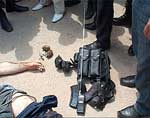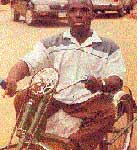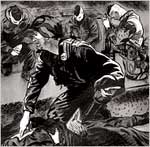From the New York Times:
Still, Hassan Dahir Aweys, of the powerful Ayr clan, has publicly told followers that God would forgive them for spilling the blood of any foreign peacekeepers who set foot on Somali soil. He has also said Somalis who hand over their countrymen to American operatives in exchange for cash are guilty of “selling us to the Jews.”
Mr. Aweys was appointed to lead a new 88-member council at a meeting of hundreds of Islamic leaders in Mogadishu on Saturday night. Earlier in the week, a delegation of Somali Islamists agreed to recognize and work together with the secular government that was formed in 2004 after long peace negotiations involving all of Somalia’s clans. That United Nations-backed government, based in the provincial town of Baidoa because Mogadishu had been considered too dangerous for it to relocate there, is struggling to gain a foothold.
Mr. Aweys has repeatedly declared that an Islamic state is the only answer for Somalia, which has effectively been in anarchy since its last government fell in 1991. Mr. Aweys is a critic of the secular government and a longtime foe of its president, Abdullahi Yusuf Ahmed.
Here.


























